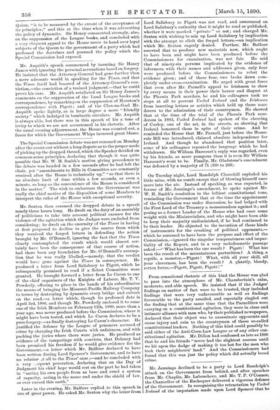Mr. Sexton then resumed the dropped debate in a speech
nearly three hours long. He dwelt on the duty of an assembly of politicians to take into account political excuses for the
violence of the agitation which the Judges were excluded from considering; he dwelt on the enormity of the Times in having at first proposed to decline to .give the source from which they received the forged letters in defending the action brought by Mr. O'Donnell, ignoring the fact that the Times clearly contemplated the result which would almost cer- tainly have been the consequence of that course of action, had there been any foundation for Mr. O'Donnell's assump- tion that he was really libelled,—namely, that the verdict would have gone against the Times in consequence. He produced a letter from Lord Salisbury to Pigott, which he subsequently promised to read if a Select Committee were granted. He brought forward a letter from Le Caron to one of the chief organisers of the Knights of Labour, Mr. T. V. Powderly, offering to place in the hands of his subordinates the means of bringing the Missouri-Pacific Railway Company to terms by destroying by dynamite every bridge and culvert on the road,—a letter which, though its professed date is April 3rd, 1886, and though Mr. Powderly enclosed it to some one of the Irish Members on February 12th, 1889, more than a year ago, was never produced before the Commission, where it might have been tested, and which Le Caron declares to be a pure forgery,—as finally destroying Le Caron's character. He justified the defence by the League of prisoners accused of crime by charging the Irish Courts with unfairness, and with packing the juries where there were juries. He produced as evidence of the tamperings with convicts, that Delaney had been promised his freedom if he would give evidence for the Government,—a letter which Mr. Balfour declared to have been written during Lord Spencer's Government, and to have no relatior all to the Times' case ;—and he concluded with a very ,,oquent peroration, declaring that on the Day of Judgment his chief hope would rest on the part he had taken in " saving his own people from as base and cruel a system of rapacity, acting in the name and under the shield of law, as ever cursed this earth."






































 Previous page
Previous page